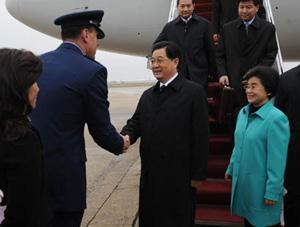Chinese President Hu Jintao has arrived in Washington for a weekend summit on the global financial crisis.
Other world leaders from the G-20 are also arriving.
 |
|
Chinese President Hu Jintao (C) and his wife Liu Yongqing (1st R) arrive in Washington, capital of the United States, on Nov. 14, 2008, for a summit to discuss issues concerning financial markets and the global economy. [Li Xueren/Xinhua] |
There's much hope that the meeting that starts Saturday will find a way out. of the worst market meltdown in 80 years.
The stage has been set up at the National Building Museum, the site of the G-20 summit. What takes place here over the weekend will be closely followed.
Chinese President Hu Jintao arrived in the US capital on Friday. Only five days before, the Chinese government announced a massive stimulus package involving a capital injection of 4 trillion yuan or well over 580 billion US dollars.
The Washington summit is bringing together heads of state from major economic powerhouses like the US, Japan, and Germany, as well as emerging economies like China and India.
The heads of international organizations like the UN, the IMF, and the World Bank will also be present.
In addition, finance ministers from South Korea, Japan, and China plan to meet on the sidelines of the summit.
Together, the G-20 group represents some 80 percent of the global G-D-P, 75 percent of international trade, and roughly 70 percent of the world's population.
Analysts believe that by working together, the group can help resolve the financial crisis.
Graham Wisner, Lawer of Patton Boggs Law Firm, said, "Well I think it is important that all the nations' leaders, economic leaders and political leaders come together and reiterate that this is a global problem. I think that it is certain that we are going to see increased emphasis on transparency in the financial markets and an effort to coordinate the regulation of the financial institutions particularly because they cross over borders."
The worst financial crisis in 80 years has weakened the world's major economies. Official data show the 15-nation euro zone economy had shrunken by 0.2 percent for the second quarter in a row.
Analysts believe one of the major topics in the next days will be whether there should be more state control of financial markets. On this issue, however, the stances of the US and much of Europe are wide apart.
(CCTV November 15, 2008)